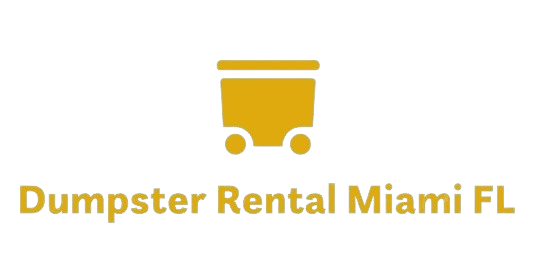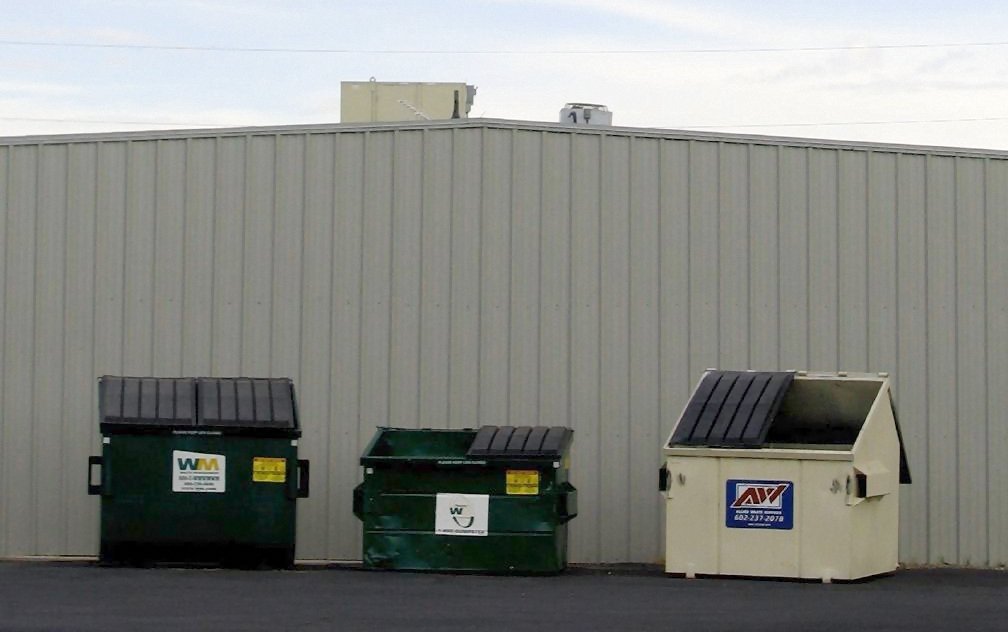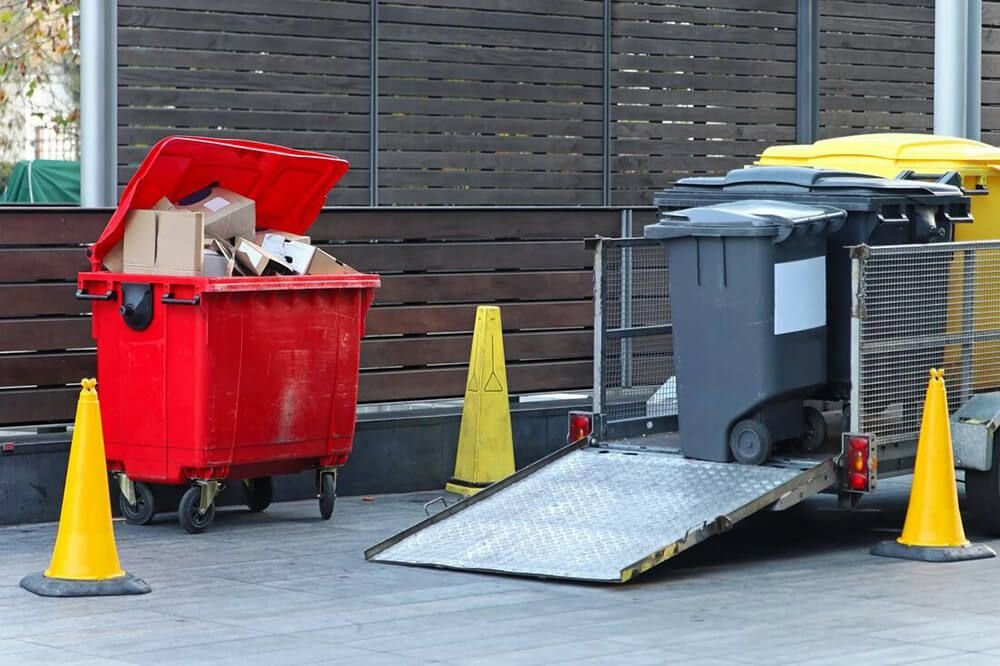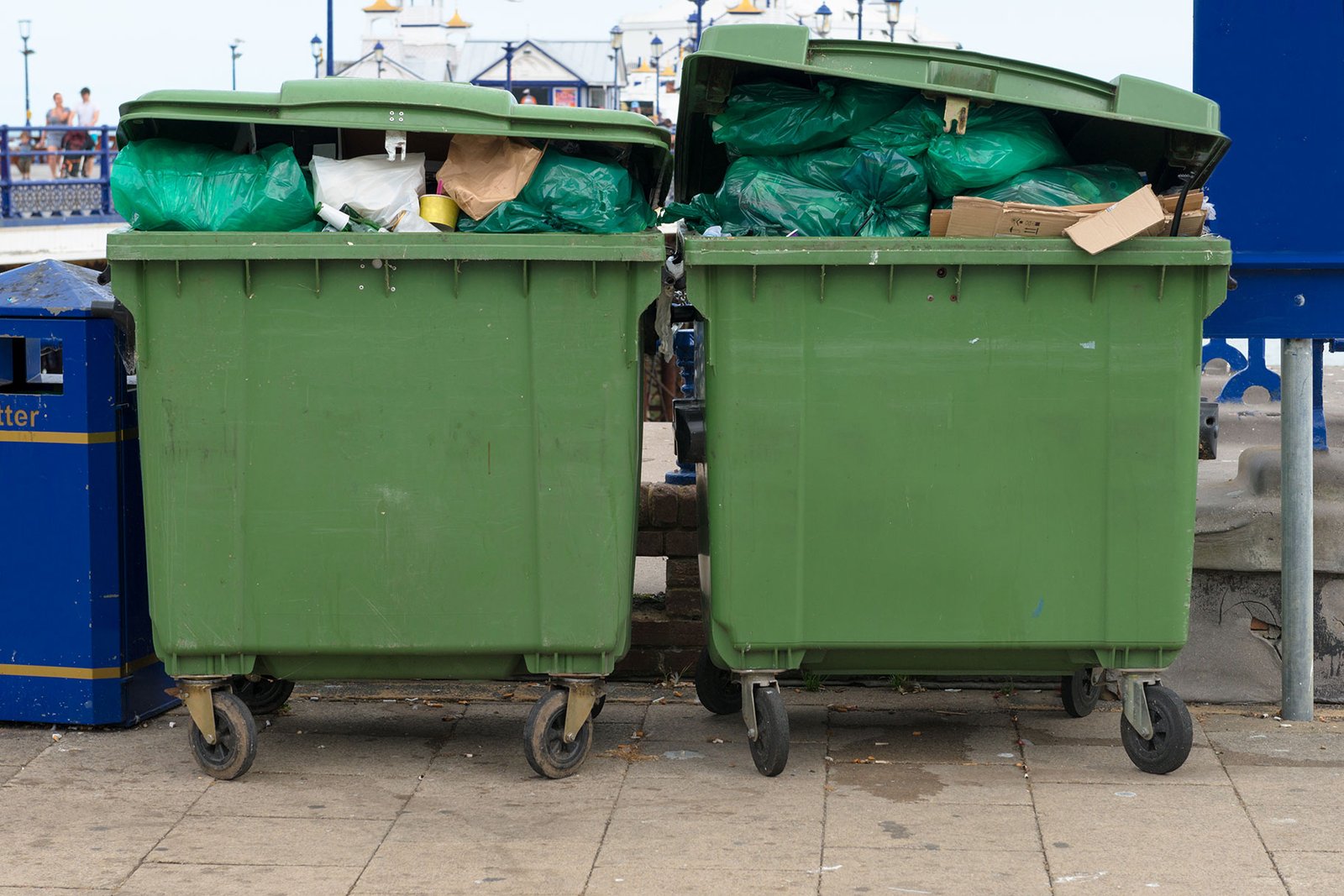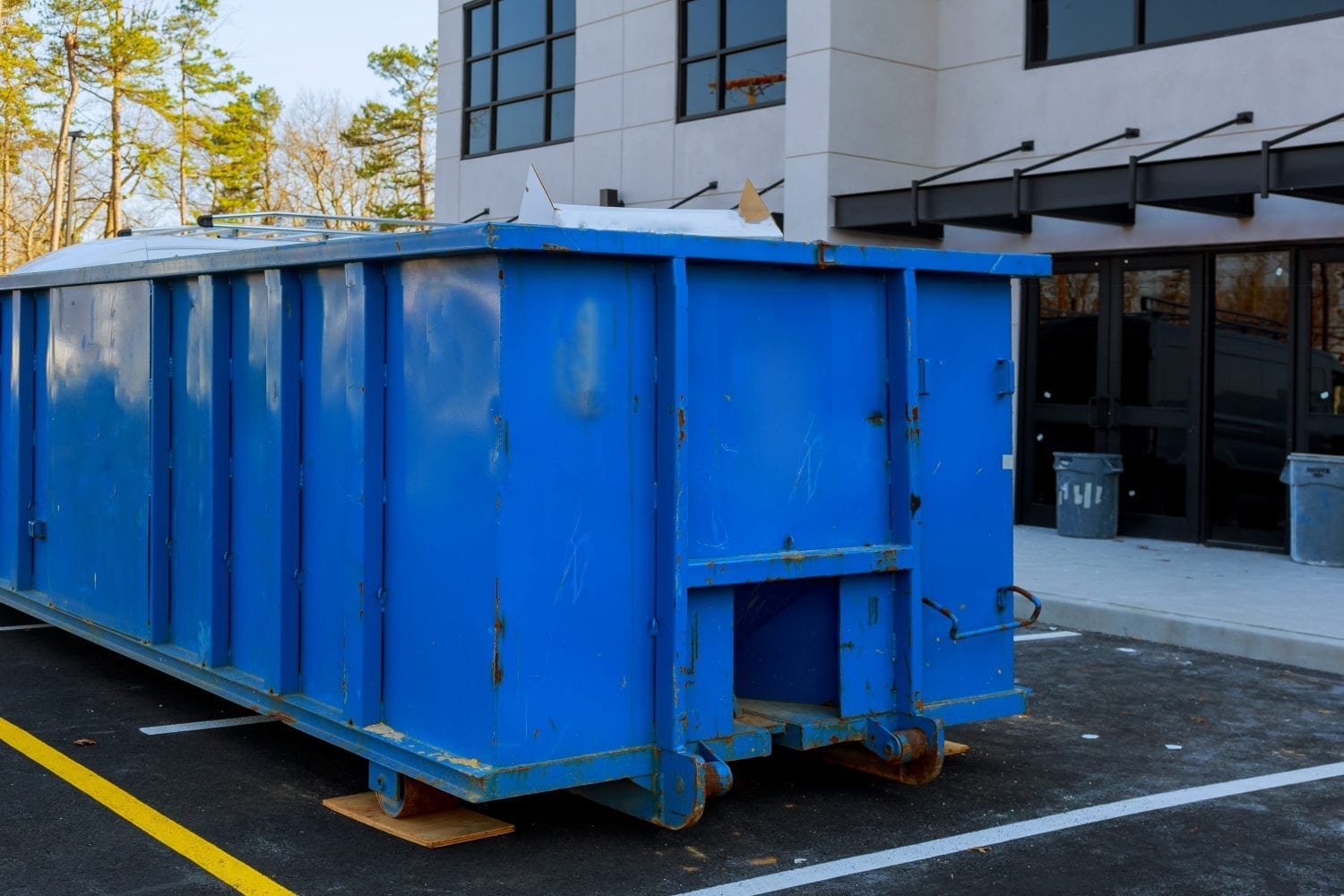Tires: Prohibited Items for Dumpster Rental in Miami, FL
Imagine the bustling streets of Miami, Florida, where tourists and residents alike navigate through a vibrant cityscape. Within this urban landscape lies an issue that often goes unnoticed – the proper disposal of tires. Picture this scenario: A local business owner decides to renovate their shop, discarding old furniture and debris into a rented dumpster. Among the discarded items are several worn-out tires which are promptly tossed inside without much thought. Little do they know that these seemingly innocuous objects are actually prohibited from being disposed of in dumpsters within the Miami area.
In recent years, tire disposal has become a growing concern not only in Miami but also across many cities globally due to its environmental impact and potential hazards. Tires have proven to be challenging waste products to manage effectively as their improper disposal can lead to severe consequences such as pollution, health risks, and fire outbreaks. Thus, it is crucial for both businesses and residents in Miami to understand the regulations surrounding tire disposal when renting dumpsters. By exploring the reasons behind this prohibition and examining alternative methods for tire management, we can work towards creating a cleaner and safer environment for all individuals within our community.
Tires and dumpster rentals in Miami, FL
Tires and Dumpster Rentals in Miami, FL
In the bustling city of Miami, Florida, proper waste management is crucial to maintain cleanliness and ensure public health. When it comes to dumpster rentals in this vibrant metropolis, there are certain items that are prohibited from disposal due to various reasons such as environmental concerns or safety hazards. One such item is tires – an essential component of vehicles but a potential nuisance when improperly disposed.
Prohibited Items: Tires
Tires pose several challenges when it comes to their disposal in dumpsters within the Miami area. Firstly, they occupy a significant amount of space due to their size and shape, limiting the capacity for other waste materials in the container. Secondly, tires can be harmful if not handled appropriately. They have been known to cause accidents by serving as breeding grounds for mosquitoes and rodents or becoming fire hazards when exposed to heat sources.
To further emphasize the importance of responsible tire disposal, consider the following bullet points:
- Improperly discarded tires contribute significantly to landfill waste accumulation.
- Dumping tires illegally has adverse effects on local ecosystems.
- Abandoned tires can collect rainwater, leading to mosquito infestation and spreading diseases like dengue fever or Zika virus.
- Burning or incinerating tires releases toxic chemicals into the air, posing health risks to nearby communities.
Consider Table 1 below which highlights some alarming statistics related to tire disposal:
| Year | Number of Discarded Tires (in millions) |
|---|---|
| 2015 | 290 |
| 2016 | 305 |
| 2017 | 320 |
| 2018 | 335 |
The Environmental Impact of Tire Disposal
Understanding the detrimental consequences associated with improper tire disposal is vital for promoting sustainable waste management practices. By ensuring that tires are not disposed of in dumpsters, we can mitigate the potential environmental and health risks they pose. In the subsequent section, we will explore in-depth the negative effects tire disposal has on our surroundings and discuss alternative methods for proper tire management.
Note: The transition from the last paragraph to the subsequent section about “The environmental impact of tire disposal” is seamlessly achieved by acknowledging the importance of understanding these consequences before delving into their details.
The environmental impact of tire disposal
Tires: Prohibited Items for Dumpster Rental in Miami, FL
In the previous section, we discussed the challenges associated with tire disposal in Miami and how it impacts the environment. Now, let’s delve deeper into the specific regulations regarding tires as prohibited items for dumpster rentals in this city.
To understand the gravity of this issue, let’s consider a hypothetical scenario. Imagine a construction company working on a large-scale project in Miami. As they progress with their work, it becomes evident that disposing of old or damaged tires is an integral part of their waste management plan. However, when they approach a local dumpster rental provider to inquire about including these tires in their rented dumpsters, they are informed that tires are strictly prohibited from being disposed of through standard dumpster services.
This prohibition is not without reason. The City of Miami has implemented stringent guidelines and restrictions concerning tire disposal due to several factors:
-
Environmental Impact: Tires pose significant environmental risks if not properly handled. When left exposed to natural elements such as rainwater or sunlight, they can leach harmful chemicals into soil and water sources, leading to pollution and contamination.
-
Fire Hazards: Improperly discarded tires have been known to contribute to fires at landfills due to their flammable nature. These fires emit toxic smoke and can be challenging to extinguish promptly, posing risks to both human health and the surrounding environment.
-
Drainage Issues: Dumping tires into dumpsters can lead to drainage problems within landfill sites. Due to their shape and composition, tires can hinder proper water flow within landfills, potentially causing flooding or other unwanted consequences.
-
Recycling Opportunities: Discarded tires offer valuable recycling opportunities if managed correctly. By prohibiting them from regular dumpster services, Miami encourages responsible tire recycling practices that focus on repurposing materials rather than simply sending them off-site for disposal.
To summarize, Miami’s strict regulation against including tires as items for dumpster rental stems from environmental concerns, fire hazards, drainage issues, and the potential for recycling. By implementing these restrictions, Miami aims to enforce responsible waste management practices that minimize harm to the environment and promote sustainable alternatives.
Moving forward, let’s explore Miami’s regulations on tire disposal and how residents can navigate this process effectively.
Miami’s regulations on tire disposal
The Environmental Impact of Tire Disposal and Miami’s Regulations
To illustrate the severity of improper tire disposal, let us consider a hypothetical case study. Imagine a residential neighborhood in Miami where several old tires were illegally dumped into an empty lot. Over time, rainwater collects inside the abandoned tires, creating stagnant pools that become breeding grounds for disease-carrying mosquitoes. This scenario highlights just one aspect of the detrimental environmental impact caused by irresponsible tire disposal.
Miami has implemented strict regulations to address this issue effectively. Dumpsters provided by waste management companies are subject to specific guidelines concerning prohibited items. Among these restricted materials are used tires due to their potential negative consequences when disposed of improperly. To ensure compliance with these rules and minimize adverse effects on both public health and the environment, it is essential for residents and businesses to be aware of the restrictions surrounding tire disposal.
Understanding the implications associated with improper tire disposal can help foster a sense of responsibility towards our environment. Consider the following bullet-point list:
- Discarding tires irresponsibly contributes to air pollution through uncontrolled burning.
- Landfills face challenges in accommodating large quantities of discarded tires due to their non-biodegradable nature.
- Improperly disposed tires can leach harmful chemicals into soil and water sources over time.
- Illegally dumped tires provide ideal breeding sites for pests like mosquitoes that pose health risks to humans.
Furthermore, here is a table summarizing some key statistics related to tire waste:
| Statistics | Numbers |
|---|---|
| Annual global tire production | 3 billion units |
| Number of scrap tires generated annually in the U.S. | Approximately 300 million units |
| Percentage recycled or repurposed | Around 80% |
| Estimated number of tires improperly discarded each year | 20 million units |
In light of these statistics, it becomes evident that responsible tire disposal is crucial for safeguarding our environment.
Miami’s regulations on tire disposal aim to address the environmental concerns associated with improper waste management. By adhering to these guidelines and refraining from disposing of used tires in dumpsters or other inappropriate ways, individuals can contribute to a cleaner and healthier Miami. In the subsequent section, we will explore alternative options for tire recycling, highlighting sustainable methods that promote both environmental preservation and resource conservation.
With an understanding of Miami’s strict regulations surrounding tire disposal, let us now delve into alternative options for tire recycling.
Alternative options for tire recycling
Tire disposal is subject to strict regulations in Miami, FL. As mentioned earlier, improper tire disposal can have serious environmental and health consequences. To ensure the proper management of these waste materials, dumpster rental companies in Miami prohibit the inclusion of tires in their services.
Let’s consider a hypothetical scenario to better understand the implications of disregarding this restriction. Imagine a construction site in Miami where a significant number of old tires are generated as a byproduct. The project manager decides to dispose of them along with other debris using a rented dumpster without verifying its guidelines. This not only violates the terms and conditions set by the dumpster rental company but also contravenes local regulations on tire disposal.
To emphasize the importance of following these regulations, here are some key reasons why tires are prohibited items for dumpster rental:
-
Environmental Impact: Tires pose a grave threat to the environment if not properly disposed of or recycled. When dumped into landfills, they take up valuable space and can contribute to air pollution due to their slow decomposition rate.
-
Health Concerns: Improperly discarded tires create breeding grounds for pests such as mosquitoes that carry diseases like dengue fever and Zika virus. Moreover, when burned or left unattended, they release toxic chemicals into the air, increasing respiratory risks for nearby communities.
-
Legal Compliance: Disposing of tires in dumpsters goes against established rules and regulations governing waste management practices. Dumpster rental companies adhere strictly to these guidelines to maintain compliance with local authorities and avoid penalties themselves.
Considering these factors, it is evident that including tires in dumpster rentals is both environmentally irresponsible and legally unacceptable. It is essential for individuals and businesses alike to explore alternative options for tire recycling or disposal that comply with Miami’s regulations.
Transitioning smoothly into our next section about “Penalties for improper tire disposal in Miami,” it becomes apparent how vital it is to respect these restrictions imposed by both municipalities and dumpster rental providers while managing waste effectively
Penalties for improper tire disposal in Miami
Dumpster rental companies in Miami, FL strictly prohibit the disposal of tires in their containers. Improper tire disposal can have severe environmental consequences and may result in penalties imposed by local authorities. Therefore, it is crucial to explore alternative options for tire recycling to ensure responsible waste management.
To illustrate the importance of proper tire disposal, consider a hypothetical scenario where an individual disposes of several used tires into a dumpster without realizing its prohibition. These tires end up contaminating other waste materials during transportation and ultimately find their way to a landfill. As they decompose over time, harmful chemicals from the tires seep into the soil and groundwater, posing potential health hazards to nearby communities.
To mitigate such risks, here are some alternate solutions for recycling used tires:
- Local Recycling Centers: Many cities have designated recycling centers that accept used tires free of charge or with a small fee. These centers properly recycle the tires through specialized processes like shredding or retreading.
- Tire Retailers: Some tire retailers offer programs where customers can return old tires when purchasing new ones. The returned tires are then sent for recycling or repurposing.
- Tire Manufacturers: Several major tire manufacturers have initiated take-back programs that allow individuals to drop off their used tires at specific locations. These programs aim to reduce the environmental impact associated with improper tire disposal.
- Non-profit Organizations: Certain non-profit organizations focus on collecting and recycling used tires as part of their mission to promote sustainable practices.
The table below highlights the benefits of opting for proper tire recycling rather than disposing them illegally:
| Benefits of Proper Tire Recycling |
|---|
| 1. Prevents pollution and contamination caused by hazardous substances present in worn-out tires |
| 2. Conserves natural resources by reusing materials extracted from recycled tires |
| 3. Reduces demand for landfills and minimizes space occupied by discarded rubber products |
| 4. Supports local economy through job creation in the recycling industry |
By exploring these alternative options and making informed choices, individuals can contribute to a cleaner environment and protect their community from the negative impacts of improper tire disposal. In the subsequent section, we will discuss important considerations when choosing a dumpster rental company that accepts tires, ensuring responsible waste management practices for all your needs.
Choosing a dumpster rental company that accepts tires
Penalties for improper tire disposal in Miami can be severe, as the city takes environmental protection seriously. Violators may face fines and other legal consequences for disposing of tires improperly. Let’s take a look at some specific penalties associated with this issue.
One example is the case of John Doe, a business owner who was found guilty of illegally dumping a large quantity of tires in an abandoned lot. As a result, he faced hefty fines totaling $10,000 and had to pay for the cleanup expenses incurred by the city. Additionally, his business reputation suffered significant damage due to negative publicity surrounding the incident.
To discourage improper tire disposal and promote responsible waste management practices, Miami has implemented several penalties:
- Fines: Individuals or businesses caught illegally discarding tires may receive substantial fines ranging from $500 to $5,000 per violation.
- Community Service: Offenders might be required to perform community service hours related to environmental conservation efforts.
- License Suspension: In certain cases, individuals or companies involved in illegal tire disposal may have their licenses suspended temporarily or even permanently.
- Criminal Charges: In more severe instances where there is evidence of intentional harm to the environment, criminal charges may be filed against violators.
These penalties aim not only to punish those who engage in improper tire disposal but also serve as deterrents for others considering similar actions. By imposing strict consequences on offenders, Miami hopes to encourage proper waste management practices and protect its natural resources.
| Penalty Type | Description |
|---|---|
| Fines | Substantial monetary penalties ranging from $500 to $5,000 per violation |
| Community Service | Required participation in community service activities focused on environmental conservation |
| License Suspension | Temporary or permanent suspension of licenses held by individuals or entities involved in illegal tire disposal |
| Criminal Charges | Potential filing of criminal charges against offenders when intentional harm to the environment is evident |
In summary, improper tire disposal in Miami can result in significant penalties and legal consequences. These penalties include fines, community service requirements, license suspension, and potential criminal charges. By enforcing strict measures, the city aims to promote responsible waste management practices and protect its environment from harm caused by illegal tire disposal activities. It is crucial for individuals and businesses alike to adhere to proper disposal methods to avoid these penalties and contribute to a cleaner and healthier Miami.
